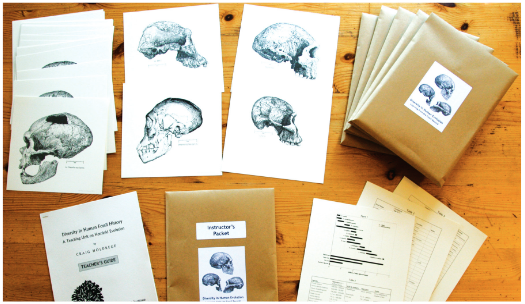Our Encounter with Institutionalized Dogmatism in Biology
Craig Holdrege
Last year we wanted to place an advertisement in the journal The American Biology Teacher, which is published nine times a year by the National Association of Biology Teachers (NABT). The ad would have highlighted our new kit on “Diversity in Human Evolution” and my recent monograph, Do Frogs Come From Tadpoles? We soon realized, however, that placing the ad was not a straightforward task.
We contacted the association and described the ad. The executive director replied that “NABT has a policy that all materials from new advertisers be reviewed for consistency with the association’s policies on scientific integrity and other formal positions … In addition to the title ‘Do Frogs Come from Tadpoles?’, I see the Nature Institute also has some resources about evolution, and specifically on hominid evolution, that will also need to be reviewed.”
This happened in August 2017, and we were told that it was not possible to say how long the review process would take. Nine months later, in May 2018, we received the following notification that our request to submit an ad had been rejected:
The association has completed reviewing and have concluded that [the frog monograph’s] contents are inconsistent with NABT’s policy on promoting scientific integrity as well as its current position on teaching evolution [nabt.org/Position-statements-NaBt-Position-statement-on-teaching-Evolution]. As a result, the association will not allow the advertisement or promotion of your monograph through NABT products or events.
I wasn’t terribly surprised at the rejection, since NABT’s position statement on evolution suggests that it does not want to promote any perspectives that might call into question or even expand what its leaders apparently believe to be the standard mechanistic view of evolution. In effect, the organization promotes a kind of dogma that fortifies it against any challenges coming from intelligent design theory or other positions. It appears that NABT wants to protect its readers from heresies.
I decided to respond to the decision — as calmly as I could, given that their position reflects a kind of dogmatism and censorship, which flies in the face of the spirit of open scientific inquiry. Below is the text of my May 2018 email letter to the organization. I received no response to the concerns I expressed in this letter.
Dear —
Colleen passed on to me your email informing us that you will not accept our request — submitted in august 2017 — to advertise in your journal.
I wholeheartedly agree with Dobzhansky’s statement that “nothing in biology makes sense except in the light of evolution,” which you cite in your position statement on teaching evolution. But since our understanding of evolution is continually evolving, theories and proposed mechanisms change over time. Thirty years ago, Lamarckianism was heretical and considered unscientific. Now it has become one additional way of understanding certain evolutionary processes. Articles that discuss Lamarckian-type processes appear in Nature, Science, and other respected journals; witness the whole surge in research on the importance of epigenetic inheritance. The search for truth in science will always lead beyond existing paradigms.
Your policy statement emphasizes the bedrock acceptance of evolution — with which we at The Nature Institute fully agree — and also the discussion of mechanisms. If you review the scientific literature, there is no consensus about these mechanisms. Therefore students need to learn both existing theories and mechanisms, and learn that we don’t have all the answers. Otherwise, instead of promoting open-ended scientific inquiry, teachers will be promulgating a doctrine. That is my concern about your policy.
Many teachers (secondary and post-secondary) have profited from our educational resources, so that is why we have a hard time understanding why you would want to prohibit your readers from exposure to them. We do critique theories and proposed mechanisms (nothing special in science), but as part of the work to gain greater insight that enhances and expands knowledge. Is that “dangerous” for your readers?
You write that the resources we wanted to make known through the ad not only do not conform with your evolution policy, but are also “inconsistent with NABT’s policy on promoting scientific integrity.” What is your concept of “scientific integrity” and how do we transgress it?
I do not write in hopes that you will change your mind about your decision. But I do feel the need to express my disappointment that — as an organization that wants to support and encourage good biology education — your policy treats your readers as followers of a doctrine who need to uphold some imagined status quo. Couldn’t you rather assume that your readers are mature, discerning human beings, who can make their own choices about what they find stimulating and relevant in the search for a deeper understanding of evolution and the origin of species — that “mystery of mysteries” Darwin spoke of ?
Sincerely,
Craig Holdrege

